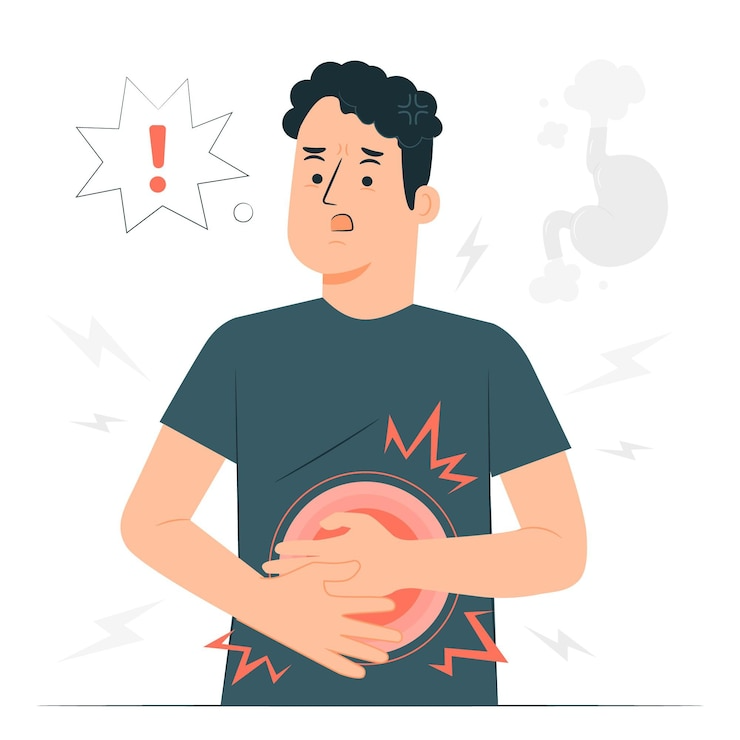A stomach ulcer, more commonly known as a peptic ulcer, is a sore or lesion involving the stomach lining or the small intestine’s upper part. These ulcers can cause discomfort and, if untreated, may result in serious complications.
However, understanding the causes, symptoms, and treatment alternatives for stomach ulcer disease is very important in managing and preventing the condition.
What Causes Stomach Ulcer Disease
The stomach ulcer occurs when the mucus’s protective lining becomes damaged, allowing the stomach’s acidic environment to erode the tissue beneath the lining. The main causes of stomach ulcers include:
1. Helicobacter pylori Infection
Helicobacter pylori bacteria generally cause most of the peptic ulcers. These bacteria can reduce the protective mucus lining of the stomach, thus making the lining prone to attack by acid.
2. Nonsteroidal Anti-Inflammatory Drugs (NSAIDs)
The use of NSAIDs such as aspirin, ibuprofen, and naproxen more frequently irritates the lining of the stomach. These drugs block the release of prostaglandins that help shield the stomach’s lining.
3. Heavy Use of Alcohol
Heavy consumption of alcohol can inflame the lining of the stomach and can increase the release of acid in the stomach. It can also be a cause of ulcers.
4. Smoking
Smoking is a significant risk factor for developing stomach ulcers. It damages the lining of the stomach and reduces the effectiveness of treatments for existing ulcers. Additionally, smoking increases stomach acid production, further aggravating the condition.
5. Stress and Diet
Stress and spicy foods were earlier considered significant causes of ulcers. Recent studies have suggested that they can only worsen but not cause the disease. High stress levels, however, lower the immune system and make it difficult for the body to fight off H. pylori infections.
6. Other Factors
More commonly, stomach ulcer disease results from conditions such as Zollinger-Ellison syndrome, in which the stomach produces too much acid.
Symptoms of Stomach Ulcers
Symptoms of stomach ulcer disease range from mild to severe. For some people, symptoms may not appear, while for others, symptoms can cause significant distress. Early signs of a stomach ulcer include the following:
1. Abdominal Pain
The most common symptom of a stomach ulcer is a burning or gnawing abdominal pain in the upper area. Pain often worsens when the stomach is empty, such as between meals or early morning, and may be relieved by food or antacids.
2. Bloating and Fullness
People with stomach ulcer disease may feel bloated or full even after eating small amounts of food.
3. Nausea and Vomiting
Other common symptoms include nausea, which may be followed by vomiting.
4. Indigestion
Stomach ulcer disease can cause dyspepsia or indigestion, often accompanied by symptoms such as heartburn, belching, and fullness because of discomfort after eating.
5. Blood in Stool or Vomit
In more severe cases, an ulcer can bleed into the stomach or intestine, resulting in blood in the stool (possibly black or tarry) or vomit (perhaps appearing like coffee grounds).
6. Loss of Appetite and Weight Loss
Some may have a decrease in appetite, leading to unintentional weight loss. If left untreated, ulcers can lead to complications such as bleeding, perforation holes in the stomach or intestine wall, and digestive tract obstruction. These complications can be life-threatening and require immediate medical attention.

Treatment Options for Stomach Ulcers
1. Antibiotics (For H. pylori Infection)
In cases of peptic ulcers brought about by an H. pylori infection, the standard treatment approach begins with combined antibiotics to ensure that the bacteria is completely removed so the ulcer does not occur again. The most common ones include:
- Clarithromycin
- Amoxicillin
- Metronidazole
Management features typically a course of two or more antibiotics in combination with drugs that decrease stomach acid. An entire course of treatment using antibiotics will help kill off the bacteria.
2. Proton Pump Inhibitors (PPIs)
PPIs represent the category of most commonly prescribed medicines for peptic ulcers. They inhibit proton pumps lining the stomach and producing acid.
Reduced production of acids relieves pain, has a soothing effect on the ulcer for complete healing, and reduces the possibility of further complications. Prescribing the drug may take 4-8 weeks, depending upon the severity of the disease.
Some commonly used PPIs are listed below.
- Omeprazole (Prilosec)
- Lansoprazole (Prevacid)
- Esomeprazole (Nexium)
- Pantoprazole (Protonix)
PPIs are highly effective and almost always relieve ulcer pain or discomfort quickly.
3. Histamine-2 (H2) Blockers
Histamine-2 (H2) blockers are other medications that reduce the acid your stomach produces. They block histamine, a hormone that prompts your stomach to produce acid. H2 blockers are used when one cannot take PPIs or when long-term lowering of acid is required.
The following are common H2 blockers:
- Ranitidine (Zantac)
- Famotidine (Pepcid)
- Cimetidine (Tagamet)
H2 blockers are less potent than PPIs, but they still work well in relieving symptoms and helping heal an ulcer.
4. Antacids and Acid Neutralizers
OTC antacids, such as calcium carbonate (Tums) and magnesium hydroxide (Milk of Magnesia), can temporarily relieve the burning pain associated with peptic ulcers by neutralizing stomach acid.
While they will give symptomatic relief of the ulcer, they do not help heal or promote the healing process. Antacids are often given alongside other medications, such as a PPI or H2 blocker.
5. Cytoprotective Agents
Cytoprotective agents shield the ulcer from acid and speed up the healing process by forming a protective barrier over the ulcer. These drugs are often used in combination with PPIs or H2 blockers for added protection to the lining of the stomach.
Common cytoprotective agents include:
- Sucralfate (Carafate): This drug forms a protective layer over the ulcer, helping to shield it from stomach acid and promote healing.
- Misoprostol (Cytotec): This medication stimulates the production of protective mucus and bicarbonate in the stomach, which protects the lining. It is most often prescribed for ulcers caused by NSAID use.
6. Avoidance of NSAIDs
The stomach lining can become inflamed by nonsteroidal anti-inflammatory drugs (NSAIDs), including medicines like ibuprofen, aspirin, and naproxen.
If you have a peptic ulcer, you should avoid taking these medicines unless instructed by your physician. Sometimes, physicians suggest taking alternative pain relievers such as acetaminophen or Tylenol, which are less likely to cause stomach upset.
Additionally, if NSAID use is unavoidable, physicians may prescribe proton pump inhibitors or misoprostol to protect the lining of your stomach while you continue taking NSAIDs.
7. Lifestyle and Dietary Modifications
While changes in lifestyle alone cannot cure a peptic ulcer, the following modifications may help in reducing symptoms and assist in healing:
- Avoid smoking: smoking increases stomach acid production and impairs the effectiveness of ulcer treatments.
- Limit alcohol intake: Alcohol can irritate the lining of the stomach and increase the amount of acid produced, making symptoms worse.
- Eat smaller, more frequent meals: Large meals increase the production of stomach acid. Smaller meals are easier on the stomach.
- Avoid spicy, acidic, and fried foods: These foods can further irritate the stomach lining and worsen symptoms.
- Manage stress: Stress does not cause ulcers but worsens symptoms and slow healing. Consider methods for relaxation such as yoga, meditation, or deep breathing exercises.
8. Surgery (In Rare Cases)
Surgery for peptic ulcers is rarely done but may be considered in the following instances:
- Bleeding ulcers: If an ulcer starts to bleed seriously and cannot be controlled by medications, surgery might be required to stop the bleeding.
- Perforation: When an ulcer breaks a hole in the stomach or small intestine wall, surgery may be necessary to close the hole and prevent infection.
- Obstruction: In rare cases, an ulcer can obstruct the pathway for food through the intestines, necessitating surgery.
Surgical interventions include vagotomy, which involves the severing of the vagus nerve to reduce acid production, and pyloroplasty, a surgical opening of the passage between the stomach and the small intestine.
9. Follow-Up Care
Even with adequate healing after appropriate treatment, some follow-up to determine the disappearance of the ulcer will be required. If treated with H. pylori, follow-up may require several months because recurrence happens very quickly if this organism is not completely cleared.
These other tests include stool antigen tests, which detect active bacteria infection. Your physician will discuss these or other available breath tests that need oxygen to produce energy.
Prevention and Lifestyle Modifications
While some risk factors, such as H. pylori infection, cannot be prevented, there are several things the patient can do to reduce the risk of a stomach ulcer or prevent an existing ulcer from worsening:
- Avoid NSAIDs: Use over-the-counter pain relievers like acetaminophen (Tylenol) or take them with food to decrease gastric upset.
- Avoid smoking: Smoking impairs the formation of ulcers and delays the healing of ulcers.
- Avoid excessive intakes of alcohol: It would be better to limit or even avoid it, for it does not irritate the lining of the stomach.
- Cope-up with stress: Learn different skills like yoga, meditation, or deep breathing exercises when facing stress.
- Eat balanced foods: Emphasize your diet on fruits, vegetable-whole grains, and lean protein rather than foods that usually irritate your stomach, especially acidic and spicy foods.
Final Thoughts
Stomach ulcer disease is a relatively common health condition that can be upsetting, but Medications and lifestyle changes usually cure it. Individuals experiencing symptoms such as chronic stomach pain, nausea, or vomiting would seek advice from a physician to properly diagnose and intervene. Many with stomach ulcers may be appropriately treated and resume everyday lives free of symptoms.
Disclaimer
Get Health Hacks is a digital publisher and providing health and wellness content as general information. Our purpose is to provide you information, hacks, and guides to learn and achieve health goals. The content on our website, newsletter, and socials including text, graphics, images, and other material is general in nature. You should have to consult your healthcare provider before starting any nutrition, diet plan, exercise, fitness training, and wellness program.



